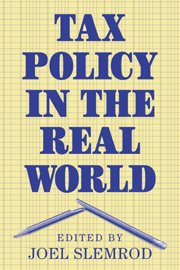Book contents
- Frontmatter
- Contents
- List of contributors
- 1 The real world of tax policy
- 2 Federal tax reform
- 3 Federalism and subfederal taxes
- 4 Principles, politics, and the professors
- Public finance in theory and practice
- On the use of ‘distribution tables’ in the tax policy process
- Taxation and economic growth
- Tax reform of the century – the Swedish experiment
- Measuring the impact of tax reform
- What is an ‘optimal’ tax system?
- How tax complexity and enforcement affect the equity and efficiency of the income tax
- Tax policy from a public choice perspective
- What is missed if we leave out collective choice in the analysis of taxation
- Public finance and public choice
- Professional opinions about tax policy: 1994 and 1934
- What can America learn from the British tax system?
- Peculiar institutions: a British perspective on tax policy in the United States
- Index
What can America learn from the British tax system?
Published online by Cambridge University Press: 01 June 2010
- Frontmatter
- Contents
- List of contributors
- 1 The real world of tax policy
- 2 Federal tax reform
- 3 Federalism and subfederal taxes
- 4 Principles, politics, and the professors
- Public finance in theory and practice
- On the use of ‘distribution tables’ in the tax policy process
- Taxation and economic growth
- Tax reform of the century – the Swedish experiment
- Measuring the impact of tax reform
- What is an ‘optimal’ tax system?
- How tax complexity and enforcement affect the equity and efficiency of the income tax
- Tax policy from a public choice perspective
- What is missed if we leave out collective choice in the analysis of taxation
- Public finance and public choice
- Professional opinions about tax policy: 1994 and 1934
- What can America learn from the British tax system?
- Peculiar institutions: a British perspective on tax policy in the United States
- Index
Summary
Abstract - This paper examines elements of British tax policy and discusses their implications for the United States, where several recent proposals would mirror aspects of the British system. These include reducing filing requirements under the individual income tax, indexing capital gains for inflation, cutting mortgage interest deductions, enacting a value-added tax, and integrating the corporate and personal income taxes. The paper also discusses implications of the poll tax for tax reform. Britain and America have made different choices involving equity, efficiency, simplicity, and other goals. These choices offer the chance to help identify the impact of tax policy.
Tax policy debates in the United States are noteworthy for their frequency, intensity, and largely inward-looking focus. Very seldom is reference made to the experiences of other countries, and the references that are made are often seriously misleading. Yet many of the major reform ideas put forth in recent years in the United States are closely related to programs that already exist in other countries.
This paper examines selected elements of British tax policy and experience and discusses their implications for United States tax policy. Britain is an instructive choice for this purpose because the British tax system is fundamentally like the American system in many respects, but contains many features that relate directly to changes currently or recently proposed in the United States.
The systems are most obviously similar in that they rely on income and payroll (social security) taxes for the bulk of their revenue.
- Type
- Chapter
- Information
- Tax Policy in the Real World , pp. 463 - 488Publisher: Cambridge University PressPrint publication year: 1999



